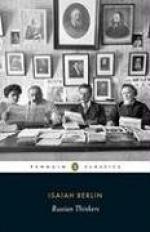|
This section contains 338 words (approx. 1 page at 400 words per page) |

|
Russia and 1848 Summary and Analysis
After the Decembrist rebellion of 1825, the once-liberal Tsar Nicholas I Romanov moved away from his earlier sympathy for reform. After the failed European revolutions of 1848, in Sicily, France, Italy and Austria (and one in Hungary in 1849, which Russian troops crushed), Nicholas increasingly saw himself as the defender of autocracy, religion and order against atheism, liberalism and revolution - not only in Russia, but for all of Europe. He repressed all signs of dissent and unorthodoxy and halted all plans for reform. Some authors, such as Nikolai Gogol, became supporters of autocracy and even presented serfdom as divinely ordained. The repression of the period from 1848 to 1855 (when Nicholas died) was "the darkest hour in the night of Russian obscurantism in the nineteenth century." In a double censorship system, a royal committee dubbed the "Second of April committee" examined works that...
(read more from the Russia and 1848 Summary)
|
This section contains 338 words (approx. 1 page at 400 words per page) |

|




